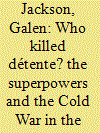|
|
|
Sort Order |
|
|
|
Items / Page
|
|
|
|
|
|
|
| Srl | Item |
| 1 |
ID:
175427


|
|
|
|
|
| Summary/Abstract |
Following the 1967 Arab-Israeli war, the United States took a relatively passive approach to Middle East peacemaking. The passivity shown by the administration of President Lyndon Johnson stemmed primarily from its belief that the Arab states had failed to make reasonable proposals for an agreement and from the White House’s awareness that pressuring Israel would likely have significant domestic political consequences. Thus, even though it felt the need to press Israel to withdraw to prewar boundaries as part of a settlement, the administration made little effort to achieve an agreement on that basis.
|
|
|
|
|
|
|
|
|
|
|
|
|
|
|
|
| 2 |
ID:
116181


|
|
|
|
|
| Publication |
2012.
|
| Summary/Abstract |
According to John Mearsheimer, the United States entered the First World War because the Wilson administration believed the Triple Entente was on the verge of defeat. As a result, he claims, the Americans entered the war to prevent Germany from becoming a regional hegemon in Europe. A careful and targeted examination of the relevant primary sources, however, demonstrates that Washington was largely unaware of the plight of the Allied powers in the spring of 1917; therefore, the argument that the United States was acting as an offshore balancer at this time is unconvincing. This article shows that unit-level factors and statecraft can play a larger role in international relations than structural realist theory allows and makes an empirical contribution to the World War I literature by demonstrating that balance of power considerations were not a major factor in the Wilson administration's decision for war.
|
|
|
|
|
|
|
|
|
|
|
|
|
|
|
|
| 3 |
ID:
181024


|
|
|
|
|
| Summary/Abstract |
Claims about Soviet policy at the end of the October 1973 Arab-Israeli war played a key role in discrediting détente in the mid- and late 1970s. This analysis considers the part that Henry Kissinger played in triggering the Soviet actions at the end of the war to which the critics of détente pointed. Contrary to what Kissinger claimed, he essentially reneged on the agreement he had reached with the Soviet leadership to end the war and instead directly encouraged the Israelis to continue military operations well after the ceasefire was supposed to take effect. That, in turn, led to a crisis that had a profound effect on Soviet-American relations for years to come.
|
|
|
|
|
|
|
|
|
|
|
|
|
|
|
|
| 4 |
ID:
138171


|
|
|
|
|
| Summary/Abstract |
To what extent do domestic politics influence the United States’ policy toward Israel? Documentary evidence demonstrates that although President Gerald Ford and Secretary of State Henry Kissinger initially sought a comprehensive Arab-Israeli peace agreement, domestic considerations played a key role in their decision to return to the step-by-step diplomacy favored by Israel’s supporters in the United Sates.
|
|
|
|
|
|
|
|
|
|
|
|
|
|
|
|
| 5 |
ID:
167085


|
|
|
|
|
| Summary/Abstract |
As was evident from the intense reaction to Donald Trump’s comments during the 2016 presidential campaign about nuclear proliferation, many analysts believe that the United States has consistently given the goal of nonproliferation a top priority since the beginning of the nuclear age. That conviction, in turn, plays a major role in policy debates among experts in this area. In this article, I show that nonproliferation does not necessarily take precedence over other important US geopolitical interests through a close examination of American policy toward the Israeli nuclear program during the 1960s. Although nonproliferation goals certainly came into play, US officials repeatedly gave priority to other key objectives and, to a real extent, even believed that Israel’s nuclearization could hold certain strategic advantages. This finding, of course, has important theoretical implications for the basic question of whether international politics still works essentially as it did in the pre-nuclear era, as well as for policy debates over nuclear proliferation.
|
|
|
|
|
|
|
|
|
|
|
|
|
|
|
|
| 6 |
ID:
170594


|
|
|
|
|
| Summary/Abstract |
Standard explanations for the demise of U.S.-Soviet détente during the 1970s emphasize the Soviet Union's inability to put aside its communist ideology for the sake of a more cooperative relationship with the United States. Soviet resistance to reaching a stable accommodation during this period, many analysts maintain, was especially evident in the Middle East, where Moscow is said to have embraced the “radical Arab program” vis-à-vis Israel. Such accounts do not fare well, however, in light of the historical evidence. Instead, that evidence indicates that the Soviet Union was eager to cooperate with the United States to achieve an Arab-Israeli agreement. The Richard Nixon and Gerald Ford administrations, however, were not interested in working with the Soviets in the Middle East, and instead sought to expel them from the region. These findings have important implications for scholarly debates about whether great power rivals can cooperate on issues where their strategic interests are overlapping, as well as for contemporary debates over U.S. policy toward countries such as China, Iran, North Korea, and Russia.
|
|
|
|
|
|
|
|
|
|
|
|
|
|
|
|
|
|
|
|
|